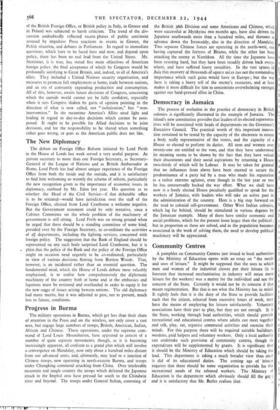Democracy in Jamaica
The process of evolution in the practice of democracy in British colonies is significantly illustrated in the example of Jamaica. The island's new constitution provides that leaders of its elected representa- tives will be associated with heads of departments on the Governor's Executive Council. The practical worth of this important- innova- tion remained to be tested by the capacity of the electorate to return a body really representative of the voters, and the capacity of a House so elected to perform its duties. All men and women over twenty-one are entitled to the vote, and that they have understood its meaning seems to be shown by the fact that they have voiced their discontents and their social aspirations by returning a House two-thirds of which will be Labour. It may be taken for granted that no influences from above have been exerted to secure the predominance of a party led by a man who made his reputation as a rather extreme agitator, even though in the last year or two he has unreservedly backed the war effort. What we shall have now is a freely elected House peculiarly qualified to speak for the workers of Jamaica, with leaders who will take an active part in the administration of the country. Here is a big step forward on the road to colonial self-government. Other West Indian colonies, which lag far behind, should be stimulated in various degrees by the Jamaican example. Many of them have similar economic and social problems, which for the present loom larger than the political ; but in proportion as these are solved, and as the population becomes associated in the work of solving them, the need to develop political machinery will be appreciated.


























 Previous page
Previous page